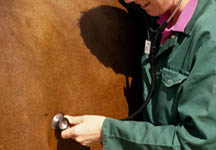Calls for tighter border controls on equine imports have been renewed following the confirmation of a third case of equine infectious anaemia (EIA) in nine months.
Defra has followed protocols for managing an exotic disease outbreak, quarantining yards in Northumberland and Devon.
The horses diagnosed with EIA — also known as swamp fever — have both been euthanased and movement restrictions have been placed on the yards involved.
At present, officials say the cases are unrelated. The horse in Northumberland did not appear ill, but was one of six “low-value” animals imported last month from the Netherlands, believed to have originated in Romania and therefore routinely tested on its arrival here.
While the other horses at the dealer’s yard have tested negative for EIA, they will remain in isolation and be retested in 30, 60 and 90 days.
A yard in Wiltshire was isolated in January and two horses with EIA imported from Romania via Belgium were euthanased.
The horse in Devon arrived in the UK two years ago and is believed also to have come by the same route. It was purchased at Hatherleigh Market and used as a leisure horse by the owner, who called a vet last week when it became ill.
Is free movement still safe?
“There is a fine balance between wanting free movement of animals for racing, competition and breeding purposes and effective disease control,” said Tim Morris, director of equine science and welfare for the British Horseracing Authority and chair of the British Horse Industry Confederation.
“Across the EU there have been a number of sporadic outbreaks over the past year — so should we be concerned that EIA is around [in the UK] more than we think it is?”
Vet Chris House, of the British Equine Veterinary Association, agreed, adding that Devon is a worryingly “warm and wet” area of the UK for a disease nicknamed swamp fever to be found.
“It all reinforces the case for pre-import testing — we shouldn’t be in this position,” he said.
“Imagine you’re buying a rescue horse from France. You haven’t a clue where it came from.”
But Prof Morris, one of a group of horse industry officials who took part in emergency tele-conferences at the weekend, said horse owners should not be “very” alarmed.
“Our experience is that, in relative terms, it is not as easy to transmit as other diseases,” he said. “But owners must be alert to anything unusual.”
This article was first published in Horse & Hound (16 September, ’10)


